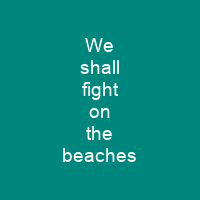Winston Churchill made the speech to the House of Commons on 4 June 1940. It was the second of three major speeches given around the period of the Battle of France. Churchill had to describe a great military disaster and warn of a possible invasion attempt by the Nazis. He also had to prepare his domestic audience for France’s falling out of the war.
About We shall fight on the beaches in brief
 Winston Churchill made the speech to the House of Commons on 4 June 1940. It was the second of three major speeches given around the period of the Battle of France. Churchill had to describe a great military disaster and warn of a possible invasion attempt by the Nazis. He also had to prepare his domestic audience for France’s falling out of the war without in any way releasing France to do so. He reiterated a policy and an aim unchanged – despite the intervening events – from his speech of 13 May, in which he had declared the goal of ‘victory, however long and hard the road may be’ The German Wehrmacht offensive in the Low Countries and France had begun on 10 May with the invasion of the Netherlands, Belgium and Luxembourg. After the capitulation of Belgium on 28 May, a gap had also appeared on the eastern flank of the Allied forces, which had been forced to retreat into a small pocket around the seaport of Dunkirk. In the air, the French were short of fighter planes, and Churchill argued in favour of sending the French fighter squadrons to France. Politically, there were considerable doubts over the French willingness to continue the war, even in the absence of any further military catastrophes. The French military commanders asked for additional British fighter squadronrons to be sent into the fight in France, hence there was a need for Churchill to make the speech.
Winston Churchill made the speech to the House of Commons on 4 June 1940. It was the second of three major speeches given around the period of the Battle of France. Churchill had to describe a great military disaster and warn of a possible invasion attempt by the Nazis. He also had to prepare his domestic audience for France’s falling out of the war without in any way releasing France to do so. He reiterated a policy and an aim unchanged – despite the intervening events – from his speech of 13 May, in which he had declared the goal of ‘victory, however long and hard the road may be’ The German Wehrmacht offensive in the Low Countries and France had begun on 10 May with the invasion of the Netherlands, Belgium and Luxembourg. After the capitulation of Belgium on 28 May, a gap had also appeared on the eastern flank of the Allied forces, which had been forced to retreat into a small pocket around the seaport of Dunkirk. In the air, the French were short of fighter planes, and Churchill argued in favour of sending the French fighter squadrons to France. Politically, there were considerable doubts over the French willingness to continue the war, even in the absence of any further military catastrophes. The French military commanders asked for additional British fighter squadronrons to be sent into the fight in France, hence there was a need for Churchill to make the speech.
The major part of the speech is an account of military events – so far they affected the battle – since the German breakthrough at Sedan. A relatively thinly held area was exploited and the BEF and the French First Army were cut off from the main French forces. The British military evaluation was that this was unlikely to withstand any major attack by the Wehr macht. The speech was given as a result of dissatisfaction with the conduct of the War, demonstrated by the Norway debate on the Allied evacuation of Southern Norway. It is one of the most famous speeches of the Second World War, and is considered to be one of Britain’s most important. The other two are the \”Blood, toil, tears and sweat\” speech of13 May and the \”This was their finest hour\’ speech of 18 June, both of which were also delivered to the Commons of the Parliament of the United Kingdom. The speeches are broadly similar in themes, but each addressed a different military and diplomatic context. They were written in response to a series of events that had occurred over a five-week period in May and June 1940, including the German attack on Sedan and the Allied retreat from Dunkirk, as well as the fall of France at the end of the First World War. The words ‘We shall fight on the beaches’ are a common title given to Churchill’s speeches.
You want to know more about We shall fight on the beaches?
This page is based on the article We shall fight on the beaches published in Wikipedia (as of Dec. 10, 2020) and was automatically summarized using artificial intelligence.







